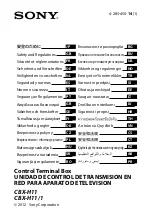
Manual for CYPRUS (V1.0) (Core Pentium & Core i-Series)
Page 22
Section D: Solving problems
Chapter 7: Before working on your system
Before performing repairing/replacement procedure, please make sure that you read the safety information with each
system or part. Below are some information that is important to your safety and your system’s safety:
[Note]
Only authorized technician trained by PioneerPOS should repair this system. Damage due to servicing not
authorized by PioneerPOS is not covered by your warranty. Do not try to repair at the component level such as Printed
Circuit Board (PCB), LCD Panel Unit, Inverter board, or Power Supply unit because it may cause safety hazard.
Modification of PCB such as motherboard may void the warranty that came with the component and the system.
7.1
Record keeping
1.
Keep a paper to record of serial number/part number of units and any changes you made.
2.
If you see an error message, write down the exact message on a piece of paper.
3.
If you have a digital camera, take a picture of the error message on the system. Some issues may be intermittent.
4.
Use a digital camera to take a picture before disassembling the system or removing parts. You will be able to see
how the cables are routed. Record the existing jumper setting and connector settings on your system.
7.2
Protecting your own safety
1.
Unplug power from AC power source if you need to disassemble the system.
2.
Protect your own safety with insulating glove.
3.
[Warning]
To prevent electric shock, DO NOT open up Power Supply Unit, CRT Monitor Unit.
7.3
Protecting your data
1.
Make sure that you have backed up important data. You may also create a backup image of your system.
2.
You may back up important data on a USB Memory Drive.
3.
If you have important system settings such as password, make sure you keep your password in a safe place.
7.4
Removing power source
1.
Remove power source before you try to remove any parts.
2.
Turn off the system and unplug the power from the wall.
3.
Remove any attached device with power connected to them such as LTP Printer, USB Hubs.
7.5
Electrostatic discharge (ESD)
1.
[Caution]
Electrostatic discharge (ESD) could permanently damage the electronic components in your system.
2.
Always ground yourself with a wrist grounding strap.
3.
Periodically touch an unpainted metal surface to avoid electrostatic discharge.
7.6
Handling cables and connectors
When you need to disconnect cables at COM Port, LAN port, LTP port, VGA port, Power Connector, or connectors on
MSR, do not pull the cable itself. Please remove the connector from the socket carefully. If they have a locking tab (LAN
port, COM Port), press and hold the plastic locking tab while removing the connector.
When removing the connector on motherboard, look for the location of “Pin1”. Make sure that you put the connector back
with the same way before removing it to avoid short circuit. You make take a picture of the original connectors with a
digital camera before removing it from the System Board.
7.7
Handing components
When handling CPU, memory, or hard drive, do not touch the connection surface. Hold the component by its edge and do
not hold the contact part.












































